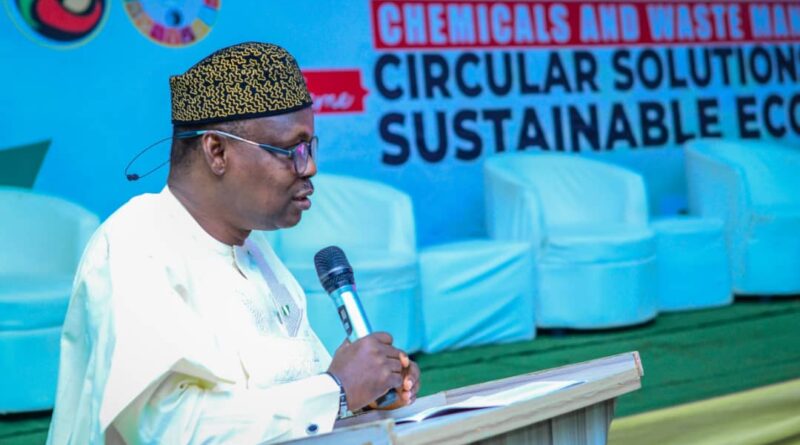Millions of Jobs can be Created through Chemical And waste management Value Chain With Circular Solution- Minister of Environment
… Says what’s called “spiritual attack” from our village people on our health are purely consequences of the mismanagement of chemicals.
Nigeria is one of the fastest growing countries in the world with a population of over 200 million, generating about 32 million tons of solid waste per year with little or no segregation and the waste often dumped in open spaces, sometimes with hazardous materials and burnt openly. These unwholesome practices have been linked to perennial flooding across the country, increased respiratory and cardiovascular diseases, increased incidences of cancer, loss of aquatic life, and agricultural productivity.
Nigerians have, therefore, been asked to maximize all the opportunities that sustainable chemicals and waste management have to offer to build a healthy population and economy. The call was made in Abeokuta by Dr. Iziaq Adekunle Salako, the Honourable Minister of State for Environment at the Ogun State Environmental Protection Agency’s Second Chemical Handler and Users’ Workshop on Tuesday, January 30th , 2024. He said some of our cries about “spiritual attack” from our village people on our health are purely consequences of the mismanagement of chemicals.
“We are all aware that chemicals are an essential part of modern society, as they are produced and used in almost every sector of our society, including industry, health, energy, transport, agriculture, construction, textiles and consumer products. The importance of chemicals to the economy of a nation cannot be overemphasized as affirmed by the International Council of Chemical Associations (ICCA). According to ICCA, the sector contributes an estimated US$5.7tn, or 7%, to the world gross domestic product (GDP) through direct, indirect, and induced impacts, supporting 120 million jobs worldwide. However, while they contribute significantly to the well-being of society, they also pose a threat to human health, the environment and sustainable development if they are not managed responsibly.

“Currently, according to the United Nations Environment Programme (UNEP), nearly 140,000 industrial chemicals are marketed worldwide including in Nigeria, meaning that hazardous chemicals, products containing them, their hazardous wastes and related pollutants continue to be released and disposed of in large quantities. The result is not only the negative impact on the environment but also on humans and animals exposed to these chemicals in different ways, causing different biological responses and oftentimes leading to serious health issues. Suffice it to say that some of our cries about “spiritual attack” from our village people on our health are purely consequences of the mismanagement of chemicals.
“Therefore, as the global community navigates through the challenges of chemicals utilization and their deleterious effects and works toward achieving development in a responsible manner devoid of consequences that would negatively impact the health of the people, Nigeria cannot afford to sit back and conduct its business as usual but must make an intentional all-inclusive and properly contextualized effort to fight the environmental ills brought about by industrialisation. Achieving this is not possible without the circular economy principle; hence, a sustainable, future-focused economy must include its development which this forum is providing an opportunity for a better understanding of the economic model”, Salako noted.

He said the Federal Ministry of Environment through the National Environmental Standards Regulation and Enforcement Agency (NESREA) is responsible for enforcing all environmental laws, guidelines, policies, standards and regulations in Nigeria, as well as enforcing compliance with provisions of international agreements, protocols, conventions and treaties on the environment to which Nigeria is a signatory. He added that part of the duty of NESREA is to enforce compliance with regulations on the importation, exportation, production, distribution, storage, sale, use, handling and disposals of hazardous chemicals and waste, another agency of the ministry, the National Oil Spill Detection and Response Agency (NOSDRA) is saddled with circular management of waste in the oil and gas sector.
Salako said, “The concept of circular economy is very broad and overarches a range of related topics, including resource efficiency, waste hierarchy, shift to renewable resources both for material and energy purposes and more. Broadly speaking, the circular economy is based on three overarching principles of designing out waste and pollution, maintaining the value of materials and products and keeping them in use as long as possible; and re-generating natural systems. Implementing circular economy will demand of us as governments, producers or manufacturers and consumers to rethink production and consumption patterns and to redefine the term “growth” into one that captures benefits beyond economic profit alone.

“We must also appreciate that the large volume of waste being generated in the country presents circular economy business opportunities across the waste management value chain which should be properly harnessed for job creation, establishment of micro, small and medium scale enterprises, private sector investment including foreign direct investment through:
• Building community material recovery facilities, recycling centers, transfer loading stations, composting facilities, etc.
• Battery recycling and export
• E-waste recycling
• PET recycling for industries
• Refuse Derived Fuel (RDF) to power cement kilns.
• Animal feed production
• Waste to energy and off-grid solutions
• Waste purchasing and reintroduction to manufacturers as raw materials or energy source.
• Ocean clean-up solutions
• Biodiesel plant
“The Federal Government is aware of the several obstacles to the implementation of a circular economy in Nigeria including inadequate policy, legal and regulatory framework, insufficient funds dedicated to promoting the concept, inadequate and unaffordable recycling technologies, dearth of information on alternatives, low level public awareness, inadequate data, economic constraints, fear of change amongst others. Despite these challenges, the Federal Government under President Bola Ahmed Tinubu is resolute in achieving a clean circular and buoyant economy for the nation and therefore, my Ministry, the Federal Ministry of Environment as part of its deliverables under the 8 presidential priority areas is expected to commence the full implementation of the circular economy roadmap for the country this 2024.
“Consequently, the ministry is taking proactive measures to promote sound circular economy principles and practices in the country. These measures include:
i. Strengthening relevant policies, and institutional and regulatory framework to address identified gaps.
ii. Building the capacity of manufacturers and producers to embrace the principles of cleaner production and circular economy in their operations.
iii. Enforcing national policies on chemicals management, solid waste management, plastic waste management and battery waste management.
iv. Implementation of the Extended Producer Responsibility (EPR) Programme.
v. Developing and implementing a waste-to-wealth entrepreneurship programme for the empowerment of the most vulnerable group in the society.
vi. Putting in place a national plastic waste recycling programme aimed at establishing at least one plastic recycling plant in each of the 774 Local Government Areas in the country.
vii. Putting in place a community-based waste management programme that encourages the involvement of local communities in modern waste management practices such as waste sorting, segregation, composting and recycling.
viii. Raising consumer awareness around sustainable purchasing practices by increasing consumer demand for greener, safer and healthier services and products.

“Recently, the ministry set up a “Circular Nigeria Committee” to come up with innovative, inclusive, locally acceptable, business friendly and scalable ways to implement the Nigeria Circular Economy Roadmap. We have also announced a ban on single use plastics in all departments, agencies, programnes and projects of the Ministry. In the days ahead, we shall be presenting a memo at the Federal Executive Council praying FEC to approve the banning of single use plastics in all MDAs of the Federal Government of Nigeria. These measures are symbolic demonstration of our commitment to frontally tackle the plastic waste menace in our environment and a warning shot that waste generation and management in our country cannot remain business as usual. As I commend the many sub-national actions by state governments being undertaken to better manage our waste and promote circularity, let me use this opportunity to call on ministries of environments in Nigeria to immediately adopt the policy of banning single use plastics in all their offices and operations as a minimum symbolic demonstration and preparation for the inevitable ban of single use plastics in our country.
“My Ministry has prioritized initiatives and programmes to promote circular management of waste in our budgetary submission for the 2024 fiscal year. Ogun State, alongside other selected states of the federation will therefore be witnessing more special intervention projects of the federal government to promote waste to wealth and waste to energy in this year.”
The Minister said the transition to a circular economy is a collective action. As a sector and as individuals, he urged all Nigerians to take responsibility.
“There is no sure way of enjoying tomorrow other than tendering today, our environment. Therefore, let us maximize all the opportunities that sustainable chemicals and waste management have to offer to build a healthy population and economy. Let us adopt best practices that will ensure that the production and use of chemicals and goods does not lead to adverse effects on human health and the environment.”




